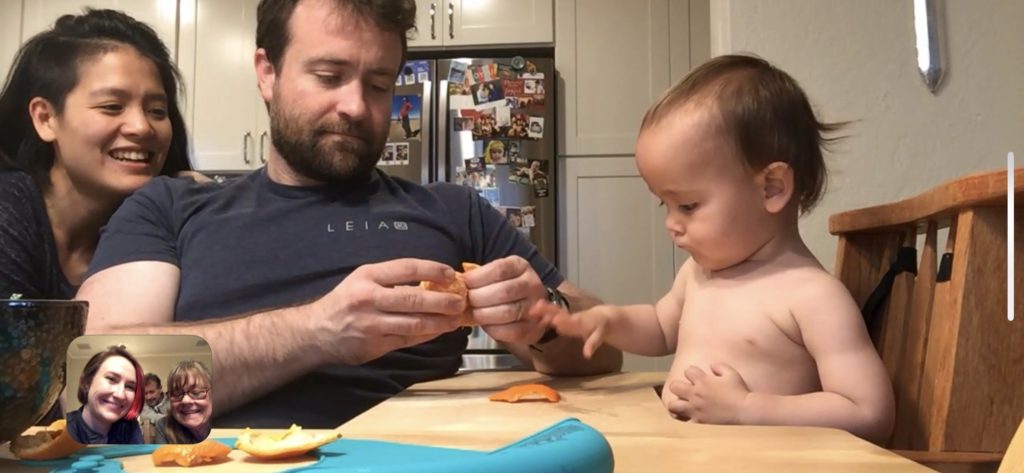
It’s no secret to anyone who knows me that I’m hopelessly smitten with my grandson, Magnus, who just turned 17 months old. Since his birth, we have made the trek from Pasadena to his home 365 miles to the north to see him at least every month. And we have had video chat catch-ups in between so he wouldn’t forget us, which, as an infant and toddler specialist, I’ve always felt a little guilty about.
I support the idea of not using screens to entertain young children, especially those under two. But the question arises, especially in this era of shelter-in-place…does video chatting between grandchildren and grandparents or other relatives count as entertainment, or as essential communication? When face-to-face, and more importantly, body-to-body, contact is impossible, are there justifications for putting a screen in front of a toddler’s face? Most parents think so, according to a study from 20151 and I tend to agree. I’m glad that the American Academy of Pediatrics’ position paper on the use of screens by infants and toddlers acknowledges that the real-time, responsive interactions toddlers have during video chats are qualitatively different than highly stimulating, heavily produced programs that capture their attention with quick cuts and noisy soundtracks, without imparting any real meaning.2 What babies learn from those kinds of videos is to be passive, to expect to be externally stimulated instead of intrinsically motivated to seek real-world active exploration and 3-D multi-sensory contact with the world.3
So with that in mind, we have a relationship-sustaining family breakfast “together” just about every day with Magnus and his parents. Our son calls us, and my husband, grown daughter who is sheltering with us, and I gather at our dining room table with the screen positioned so they can see us. We ask what he is eating, and we find out how his night went…which will influence how his parents’ day will go. It was amazing to hear the birth of a word, m’lana (meaning banana, a very important word to me as a RIE® facilitator but that’s another story). He raises his Winnie the Pooh cup towards the phone on his table, making a toast, and he high-fives the screen, which of course we reciprocate. He has even begun requesting with hand gestures the songs we sing to him. Today he asked for “Roly, Roly Poly,” and we happily chimed in.
Of course, in the beginning, Magnus seemed frustrated that he couldn’t touch us; we felt the same. But he has finally stopped trying to climb into the “box” with us, and he has begun making up his own games to play with us. We see him kiss the picture of the tree sloth on his bib before he puts it on, and then he uses it to hide from us, laughing as he pulls it down in his favorite game of peek-a-boo. The other day he initiated a rousing game of tossing a piece of his bread at the phone to share with his Auntie Ivy, who waited across cyberspace with her mouth open to “catch” it. When it fell on the table, he laughed and repeated his toss, over and over. It was ‘pretend’ and he thoroughly enjoyed it. So did Ivy, of course.
We try to be sensitive to his cues and interests, and when he is absorbed watching his dad take the waffle out of the waffle iron, or his mom get her own breakfast ready, we drop into our role as quiet observers. We feel so privileged to get to be a fly on the wall in his life. Just watching him live his life means the world to us in this strange and trying time. We try not to make him feel like it’s his job to entertain or amuse us, though like any grandparents, we would be happy to engage with him every second…but we know that’s over-the-top. And we love to just see him be him. We sit there in silence for minutes at a time, not like a more pointed phone call. In this case, the point is just to have some time together. He gets down and wanders off to play on his own when he has had enough time at the family table, and usually by then it’s time for us to get to work, anyway. We don’t want to interfere with his life. But we do want to have an ongoing relationship that he can count on, stymied by physical distancing as it is. His dad told us he kissed the screen twice today as we were saying goodbye. We’ll take what we can get until it’s safe to exchange the real hugs and kisses and high fives we’ve been saving up. We’d be counting the days, if we knew how many there were going to be….
References:
1. McLure, et al. Facetime doesn’t count. International Journal of Child-Computer Interaction archive. Volume 6 Issue C, December 2015. Pages 1-6.
2. AAP COUNCIL ON COMMUNICATIONS AND MEDIA. Media and Young Minds. Pediatrics. 2016;138(5):e2016259
3. Gerber, M. (1998). Dear parent: Caring for infants with respect. Los Angeles: Resources for Infant Educarers®.